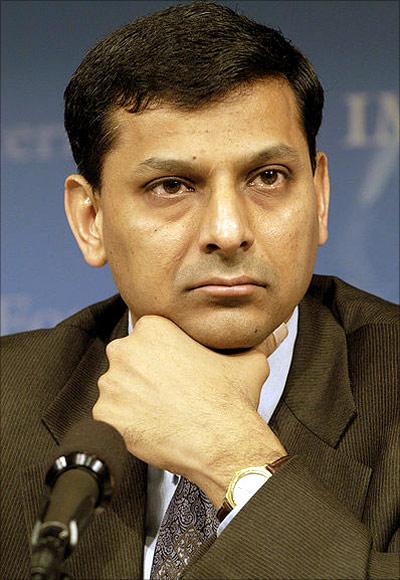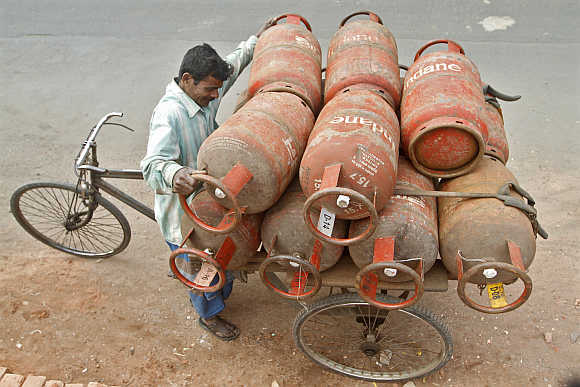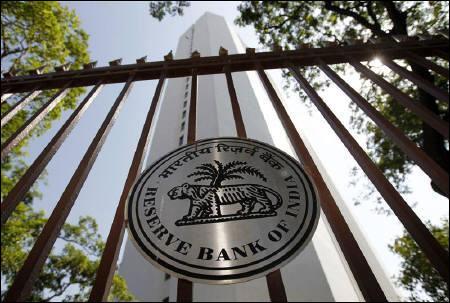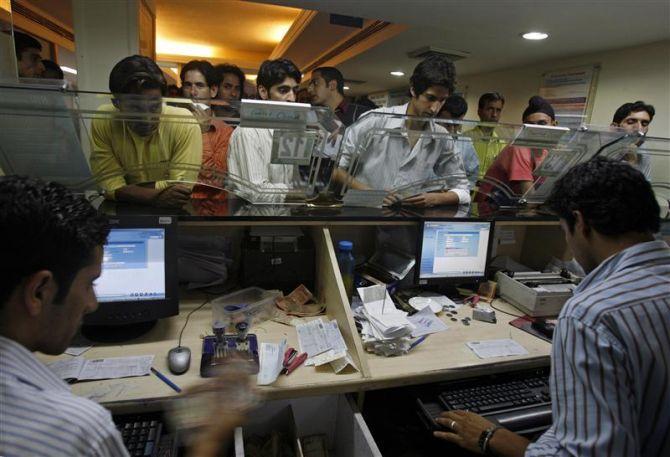 | « Back to article | Print this article |
Rajan pans raising LPG cap, says it's misdirected subsidy
Minutes after the Union Cabinet approved raising the cap on subsidised liquefied petroleum gas (LPG) cylinders from nine to 12 per connection in a year, Reserve Bank of India (RBI) Governor Raghuram Rajan questioned the decision, suggesting it was “misdirected subsidy”.
Speaking to Karan Thapar on Devil’s Advocate show, telecast on CNBC-TV18, on Thursday evening, Rajan said: “What one should be careful about is expanding the misdirected subsidies in the system. We have to be very careful because we need to spend on very important things that we are not spending on.”
Click NEXT to read more...
Rajan pans raising LPG cap, says it's misdirected subsidy
On a specific question on whether he thought the increase in LPG cylinder cap was a case of expanding the misdirected subsidy, he said he believed there was a certain chunk of the country’s population that could benefit from subsidised LPG cylinders.
“But beyond a certain point, you are reaching people who can afford to pay for it. Now whose pocket is it coming from? It’s coming from the pockets of people who are getting subsidised.”
Asked again, Rajan said they were “going from 87 per cent of the population to 97 per cent of the population. If you are subsidising 97 per cent of the population, you are basically subsidising people who are paying for it themselves”.
In an interview with Bloomberg TV, Rajan said he was intent on preventing the “extreme volatility” in the rupee. “What I am intent on is to prevent extreme volatility in the rupee, though I am not averse to adjustments,” Rajan said.
Click NEXT to read more...
Rajan pans raising LPG cap, says it's misdirected subsidy
“The free fall (of the rupee) that we saw in July and August, we don’t want to see that kind of volatility emerge. But I think we have to work on other things, too, such as monetary frameworks and health of the banking system and work on improving that. These large projects, as they get back on track, we will see the issues of some of the non-performing assets (NPA) also being resolved. We cannot wait for that to happen, we have to take an active role and make sure these things are improved,” he added.
On his decision to increase the repo rate, Rajan told Bloomberg TV in an environment where there was external turmoil, India had to get its house in order; that could not be postponed. “So, a collateral benefit of getting inflation down is that you also strengthen the belief in the value of the rupee.”
Rajan added RBI needed to be prepared for any volatility in financial markets arising out of a possible fractured mandate in the general elections due by May.
Click NEXT to read more...
Rajan pans raising LPG cap, says it's misdirected subsidy
On the Urjit Patel committee’s report on a gradual reduction of retail inflation, he said: “Ultimately, if we go towards some kind of a medium-term inflation target, like the committee has suggested, it will be good for that target to have the support of Parliament and the government.”
“Since our mandate is bringing down inflation, that we are picking a number is not inconsistent with our mandate.”
He disputed the claim that lower interest rates would lead to higher growth because banks were fixing interest rates in line with inflation. “This notion that RBI is standing in the way of growth is complete nonsense,” Rajan said, adding: “Today, what is standing in the way of growth is inflation. Unless we bring that down, growth has no hope with lower interest rates.”
“When there is huge outside turmoil — even today, the US Federal Reserve further lowered stimulus — it is extremely important that both the government and RBI be seen on the same page,” Rajan said. “There is a huge degree of understanding and communication between the government and the central bank.”
Click NEXT to read more...
Rajan pans raising LPG cap, says it's misdirected subsidy
On a possible political risk ahead, Rajan said, though there could be some volatility, “we have to plan for the possibility of a fractured verdict. Also, it is not necessary that those coalitions can’t govern. In the past, some great Budgets have come out during coalition rules. However, we have to anticipate the possibility that if something like that happens, there will be some market reactions, some volatility and we have to adjust for that.”
A day after the US Fed further cut its monthly bond-buying programme, Rajan also warned of a breakdown in global policy coordination, weakening emerging-market currencies.
“International monetary cooperation has broken down,” he said, noting how emerging markets helped pull the global economy out of crisis that started in late 2008. “Industrial countries have to play a part in restoring that. At this point, they can’t wash their hands of this and say we’ll do what we need to and you do the adjustment.”





